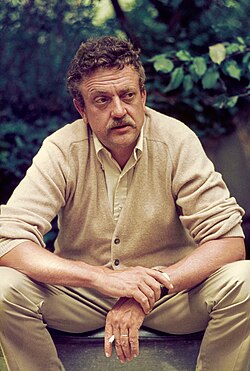Kurt Vonnegut Jr. Quote
Related Quotes
Alcohol makes other people less tedious, and food less bland, and can help provide what the Greeks called , or the slight buzz of inspiration when reading or writing. The only worthwhile miracle in th...
Christopher Hitchens
Tags:
ancient greeks, atheism, boredom, brotherhood, cana, christianity, entheos, food, hellenism, inspiration
Whenever you jump off a cliff at GOD's command, be sure that you will fly! Either by soaring on the palm of His hands or on the parachute of that command or you will suddenly have wings pop out and su...
TemitOpe Ibrahim
Tags:
absolute trust, cliff, command, experience, faith, fly, god, god is more than sufficient, jump, jump off
Whilst on board the Beagle I was quite orthodox, and I remember being heartily laughed at by several of the officers... for quoting the Bible as an unanswerable authority on some point of morality......
Charles Darwin
Tags:
atheism, autobiography, belief, charles darwin, damnable, divine revelation, doctrine, doubt, evidence, hell
Believe in God our Eternal Father, He who is greatest of all, who stands ever ready to help us and who has the power to do so. Believe in Jesus Christ, the Savior and the Redeemer of mankind, the work...
Gordon B. Hinckley
Tags:
almighty, believe, christ, comfort, dispensation, earth, eternal father, god, help, holy ghost
The miracles of Jesus are nevertheless more than individual blessings. They are also symbols and types that reveal the full scope of Jesus' identity as the mighty Jehovah, the Creator, the one who pro...
Eric D. Huntsman
Tags:
atonement, blessings, empower, jehovah, jesus christ, miracles, redeem, resurrection, savior, sin
About Kurt Vonnegut Jr.
Kurt Vonnegut ( VON-ə-gət; November 11, 1922 – April 11, 2007) was an American author known for his satirical and darkly humorous novels. His published work includes fourteen novels, three short-story collections, five plays, and five nonfiction works over fifty-plus years; further works have been published since his death.
Born and raised in Indianapolis, Vonnegut attended Cornell University, but withdrew in January 1943 and enlisted in the U.S. Army. As part of his training, he studied mechanical engineering at the Carnegie Institute of Technology and the University of Tennessee. He was then deployed to Europe to fight in World War II and was captured by the Germans during the Battle of the Bulge. He was interned in Dresden, where he survived the Allied bombing of the city in a meat locker of the slaughterhouse where he was imprisoned. After the war, he married Jane Marie Cox. He and his wife both attended the University of Chicago while he worked as a night reporter for the City News Bureau.
Vonnegut published his first novel, Player Piano, in 1952. It received positive reviews yet sold poorly. In the nearly 20 years that followed, several well regarded novels were published, including The Sirens of Titan (1959) and Cat's Cradle (1963), both of which were nominated for the Hugo Award for best science fiction or fantasy novel of the year. His short-story collection, Welcome to the Monkey House, was published in 1968.
Vonnegut's breakthrough was his commercially and critically successful sixth novel, Slaughterhouse-Five (1969). Its anti-war sentiment resonated with its readers amid the Vietnam War, and its reviews were generally positive. It rose to the top of The New York Times Best Seller list and made Vonnegut famous. Later in his career, Vonnegut published autobiographical essays and short-story collections such as Fates Worse Than Death (1991) and A Man Without a Country (2005). He has been hailed for his darkly humorous commentary on American society. His son Mark published a compilation of his work, Armageddon in Retrospect, in 2008. In 2017, Seven Stories Press published Complete Stories, a collection of Vonnegut's short fiction.
Born and raised in Indianapolis, Vonnegut attended Cornell University, but withdrew in January 1943 and enlisted in the U.S. Army. As part of his training, he studied mechanical engineering at the Carnegie Institute of Technology and the University of Tennessee. He was then deployed to Europe to fight in World War II and was captured by the Germans during the Battle of the Bulge. He was interned in Dresden, where he survived the Allied bombing of the city in a meat locker of the slaughterhouse where he was imprisoned. After the war, he married Jane Marie Cox. He and his wife both attended the University of Chicago while he worked as a night reporter for the City News Bureau.
Vonnegut published his first novel, Player Piano, in 1952. It received positive reviews yet sold poorly. In the nearly 20 years that followed, several well regarded novels were published, including The Sirens of Titan (1959) and Cat's Cradle (1963), both of which were nominated for the Hugo Award for best science fiction or fantasy novel of the year. His short-story collection, Welcome to the Monkey House, was published in 1968.
Vonnegut's breakthrough was his commercially and critically successful sixth novel, Slaughterhouse-Five (1969). Its anti-war sentiment resonated with its readers amid the Vietnam War, and its reviews were generally positive. It rose to the top of The New York Times Best Seller list and made Vonnegut famous. Later in his career, Vonnegut published autobiographical essays and short-story collections such as Fates Worse Than Death (1991) and A Man Without a Country (2005). He has been hailed for his darkly humorous commentary on American society. His son Mark published a compilation of his work, Armageddon in Retrospect, in 2008. In 2017, Seven Stories Press published Complete Stories, a collection of Vonnegut's short fiction.
